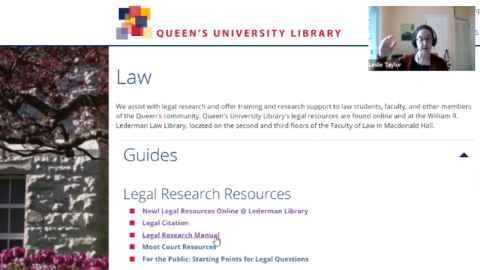
From hosting a virtual orientation and preparing e-reserves to giving online research consultations and contracting new e-resources, the Lederman Law Library continues rising to COVID challenges.
“The Law Library staff have been incredibly helpful with my research during the pandemic,” says Michael (Ruofan) Cui, Law’21. “My work has been going smoothly this year, and that’s due in no small part to the help I’ve received from librarians and library resources.”
That’s certainly the goal. “We want our services to be as convenient as possible for students,” says Amy Kaufman, Law’04, Head of the Law Library. “They are navigating a complex learning environment already and don’t need any extra complications right now.”
In place of the usual in-person tour, this year’s first-year JD students got their library introduction virtually. After completing an interactive online module, they showed what they learned by squaring off in a trivia game. “Our goal was to ensure students knew what supports the library could offer during this unconventional first year, while also giving them a chance to collaborate and engage with each other in teams as they rushed to complete the quiz,” says Erica Friesen, Law’s Research and Instruction Librarian and Online Learning Specialist Librarian. “The final results were so close that we needed to use a tiebreaking final Jeopardy! question to determine the winner.”
Students can get hard copy books and journals through curbside pickup and, from wherever they are, can access more than 1,000 new e-books in various areas of law. In addition to existing e-resources, they can now sign in to Lexis Advance Quicklaw Plus, which among other things includes e-versions of some core Canadian legal textbooks, as well as the essential Halsbury’s Laws of England.
That’s not all, says Cui, who’s been helping with research on a major immigration project and is a co-senior editor of the Canadian Labour and Employment Law Journal. “I have also received guidance from library staff to access sources such as U.K. case law and digital loose-leaf through subscription services that are available to us. Librarians have replied to all of my inquiries and requests in a timely manner and I have always felt they are doing their best to accommodate my requests.”
Online research instruction and reference consultations take place over Zoom and Microsoft Teams, with Chat and email also used for consultations – whatever way is most convenient for students. These methods have shown some advantages. “We can share our computer screens over Zoom, for example, which makes it really easy to walk someone through using a library database or other online research tool,” says Leslie Taylor, Research & Instruction Librarian. “And, if we are offering a research instruction session to a class or other group, we can record the session for people to watch and review later.”
Kaufman adds, “We quickly explored and now use many different tools to assist students in their research and learning – whether it’s emailing step-by-step screenshots on how to access a particular resource, using Snagit to make a quick short video showing how to perform a particular legal research task, giving live online instruction to individuals or classes, creating interactive modules in Articulate Rise, and videos in Camtasia.”
Missing in-person interaction, she notes, “I am always particularly happy to have an online research consultation to actually meet the students live.”
To prominently display e-books and e-resources, staff continuously update library research guides, which provide curated lists of current, authoritative sources on nearly every major legal topic. “By highlighting electronic resources, we are helping students and faculty who are working and studying remotely to easily identify research starting points that they can readily access,” says Taylor.
Working with faculty, library staff also help prepare research materials for students. For Professor Nick Bala’s first-year Contracts class, they tailored an online guide to help students research and write a memo assignment on a wrongful dismissal case. While some relevant materials on the subject and on legal research and writing were already available electronically, others are held on reserve. “Knowing the library was physically inaccessible, I spoke with reference staff and they very helpfully developed a web page just for my students,” explains Bala. “That page hosts all the relevant materials, including scans they made of the print reserve materials. Library staff have been incredibly helpful to students through their consultations and to faculty as we shift to more remote teaching and learning.”
To make that happen, Kaufman says, “There has been a real team effort across the entire Queen’s University Library System. Many staff have really put in the time to review existing resources, find and evaluate new possibilities, prioritize new e-resources, negotiate contracts, enable access, troubleshoot when there are technical problems, promote them through our Libguides, webpages, and newsletters, and instruct students and classes on how to use them effectively.”
That work hasn’t gone unnoticed. “Aside from just helping me procure sources that I requested, the librarians have pointed me in the direction of alternative sources for the material that I required,” says Cui, citing an example. “When I ran into an issue accessing an English Court of Appeal decision on the Incorporated Council for Law Reporting (ICLR), Amy Kaufman not only coordinated to resolve our issues with ICLR, but also located the same decision on QuickLaw. I felt she went above and beyond in running the search on QuickLaw (which I had not considered), and I truly appreciated her help.
“Overall,” he continues, “I’ve been very satisfied with the service the library and librarians have provided me this semester.”
By Lisa Graham